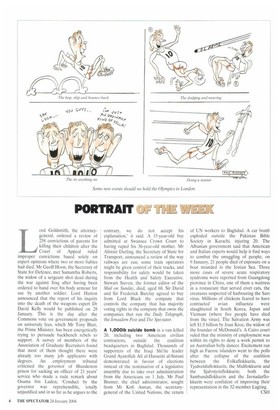L ord Goldsmith, the attorneygeneral, ordered a review of 258 convictions
of parents for killing their children after the Court of Appeal ruled improper convictions based solely on expert opinions where two or more babies had died. Mr Geoff Hoon, the Secretary of State for Defence, met Samantha Roberts, the widow of a sergeant shot dead during the war against Iraq after having been ordered to hand over his body armour for use by another soldier. Lord Hutton announced that the report of his inquiry into the death of the weapons expert Dr David Kelly would be published on 28 January. This is the day after the Commons vote on government proposals on university fees, which Mr Tony Blair, the Prime Minister, has been energetically trying to persuade backbench rebels to support. A survey of members of the Association of Graduate Recruiters found that most of them thought there were already too many job applicants with degrees. An employment tribunal criticised the governor of Blundeston prison for sacking an officer of 21 years' service who made a rude remark about Osama bin Laden; 'Conduct by the governor was reprehensible, totally unjustified and in so far as he argues to the contrary, we do not accept his explanation,' it said. A 15-year-old boy admitted at Swansea Crown Court to having raped his 36-year-old mother. Mr Alistair Darling, the Secretary of State for Transport, announced a review of the way railways are run; some train operators might be given control of their tracks, and responsibility for safety would be taken from the Health and Safety Executive. Stewart Steven, the former editor of the Mail on Sunday, died, aged 68. Sir David and Sir Frederick Barclay agreed to buy from Lord Black the company that controls the company that has majority voting rights in the company that owns the companies that run the Daily Telegraph, the Jerusalem Post and The Spectator.
A 1,000lb suicide bomb in a van killed 20, including two American civilian contractors, outside the coalition headquarters in Baghdad. Thousands of supporters of the Iraqi Shi'ite leader Grand Ayatollah Ali al-Husseini al-Sistani demonstrated in favour of elections instead of the nomination of a legislative assembly due to take over administration from the Americans on 1 July. Mr Paul Bremer, the chief administrator, sought from Mr Kofi Annan, the secretarygeneral of the United Nations, the return of UN workers to Baghdad. A car bomb exploded outside the Pakistan Bible Society in Karachi, injuring 20. The Albanian government said that American and Italian experts would help it find ways to combat the smuggling of people; on 9 January, 21 people died of exposure on a boat stranded in the Ionian Sea. Three more cases of severe acute respiratory syndrome were reported from Guangdong province in China, one of them a waitress in a restaurant that served civet cats, the creatures suspected of harbouring the Sars virus. Millions of chickens feared to have contracted avian influenza were slaughtered in South Korea, Japan and Vietnam (where five people have died from the virus). The Salvation Army was left $1.5 billion by Joan Kroc, the widow of the founder of McDonald's. A Cairo court ruled that the ministry of employment was within its rights to deny a work permit to an Australian belly dancer. Excitement ran high as Faeroe islanders went to the polls after the collapse of the coalition between the Folkaflokkurin, the Tjodveldisflokkurin, the Midflokkurin and the Sjalvstyrisflokkurin; both the Sambandsflokkurin and the Javnadarflokkurin were confident of improving their representation in the 32-member Lagting.
CSH


























































 Previous page
Previous page